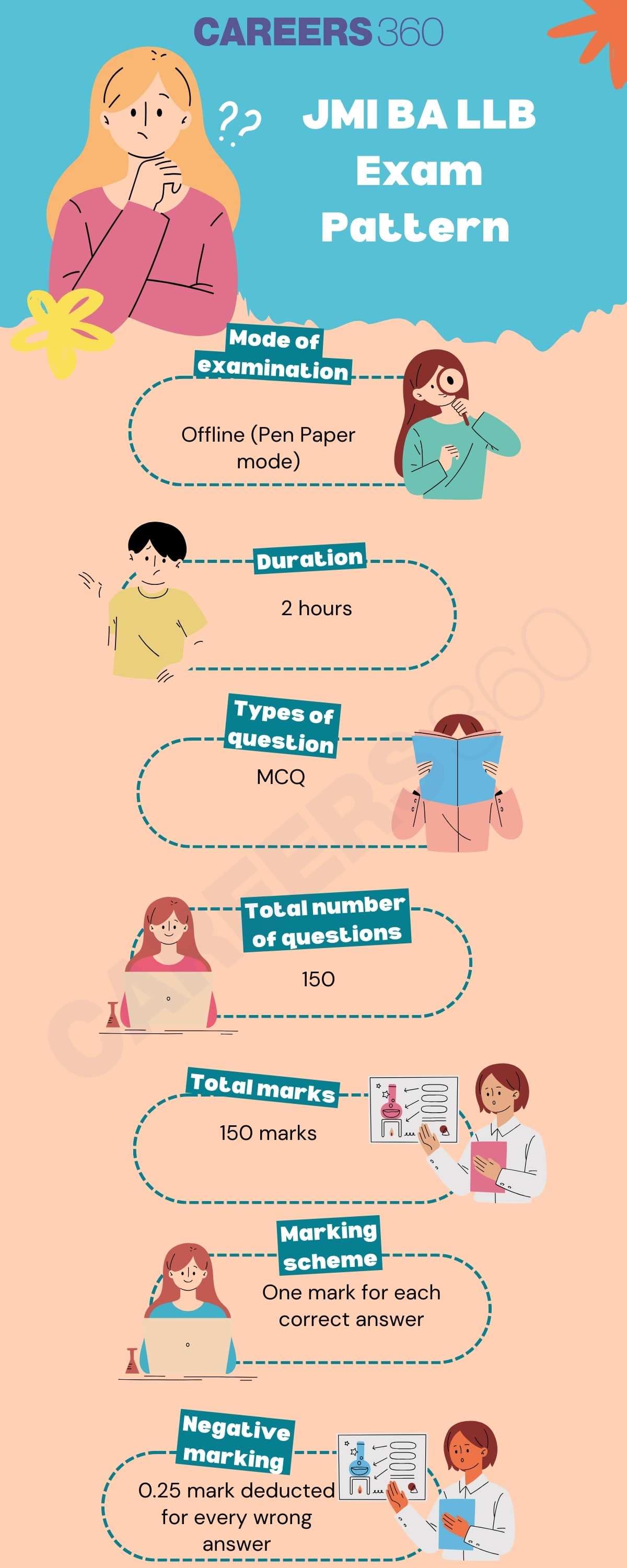UPES Dehradun BA Admissions 2026
Last Date to Apply: 25th Feb | Ranked #45 Among Universities in India by NIRF | 1950+ Students Placed, 91% Placement, 800+ Recruiters
Jamia Milia Islamia University has released the JMI BA LLB entrance exam syllabus 2026 while announcing the admission notification on its official website. Candidates appearing for the JMI BA LLB 2026 exam should refer to the JMI BA LLB entrance exam syllabus to understand the test modalities. Candidates by referring to the syllabus of JMI BA LLB 2026 will get to know about the subjects they need to study and focus on the core topics.
This Story also Contains

Candidates need to attempt five sections included in the Jamia Millia Islamia BA LLB entrance syllabus. The JMI BA LLB exam pattern consists of a negative marking scheme, where 0.25 marks will be deducted for every wrong answer. Candidates going through the JMI BA LLB syllabus 2026 will get an idea about the types of questions asked and the difficulty of the JMI BA LLB entrance exam. Jamia Milia Islamia University will conduct the JMI BA LLB 2026 tentatively in the last week of May 2026. Read the entire article to know about the detailed syllabus of JMI BA LLB, preparation tips, and the JMI BA LLB exam pattern 2026.
There are five sections in the Jamia Millia Islamia BA LLB entrance syllabus. All sections in the JMI BA LLB syllabus PDF will have multiple-choice type questions, each carrying one mark. The subject-wise syllabus and marks distribution are given below.
| Subjects | Number of questions | Marks |
|---|---|---|
Legal Language English including Comprehension | 30 | 30 |
Current Affairs | 30 | 30 |
Legal Aptitude/ Legal Reasoning | 40 | 40 |
General Studies | 40 | 40 |
Elementary Mathematics (Numerical Ability) | 10 | 10 |
Total | 150 questions | 150 marks |
Subject | Important topics |
|---|---|
Legal Aptitude/ Legal Reasoning | Legal principles relating to the law of contracts, analogies, legal principles relating to the law of family, law of crimes, the general principle of law, logical sequencing, etc |
Legal language English including Comprehension | Vocabulary, antonyms, synonyms, English grammar, idioms, proverbs, verb-subject agreement, jumbled sentences, unseen passages, common errors, sentence improvement |
Current Affairs | Events of national and international importance of last one year |
Elementary Mathematics | Simple equation, percentage, profit and loss, ratio and proportion, compound interest, simple interest, time and distance, numbers and series |
General Studies | History, Indian polity, geography, social science, general science |
Also, check - JMI BA LLB Application Form 2026
Particulars | Details |
|---|---|
Mode of examination | Offline (Pen Paper mode) |
Time duration | 2 hours (120 minutes) |
Types of question | Objective type multiple-choice questions |
Total number of questions | 150 |
Number of sections | 5 sections |
Total marks | 150 marks |
Marking scheme | One mark for each correct answer |
Negative marking | 0.25 mark deducted for every wrong answer |

Candidates must refer to the exam pattern and JMI Law entrance exam syllabus before starting their preparation.
Candidates should make a good preparation strategy according to their strengths and weaknesses.
Candidates must give equal importance to each subject to score high in each section.
Candidates must clear their basic concepts as this will help them to solve the tricky questions.
Candidates should solve the previous year's question paper to get an idea about the types of questions asked and the difficulty level.
There is a negative marking of 0.25 marks for each question marked incorrectly, so candidates must be sure while attempting the question paper.
Last Date to Apply: 25th Feb | Ranked #45 Among Universities in India by NIRF | 1950+ Students Placed, 91% Placement, 800+ Recruiters
AICTE Approved | NAAC A++ | Category 1 University by MHRD | Highest CTC 1.4 Cr LPA from Amazon
Also, check - JMI BA LLB Previous Year Question Paper
Frequently Asked Questions (FAQs)
There will be around 150 multiple-choice questions in the JMI BA LLB 2026 exam.
Yes, there is a negative marking of 0.25 marks for each answer marked incorrectly.
The syllabus of JMI BA LLB includes Legal Aptitude/ Legal Reasoning, Legal Language English including Comprehension, Current Affairs, Elementary Mathematics and General Studies.
The JMI BA LLB 2026 exam will be conducted in offline (pen-paper) mode, on June 04, 2026.
On Question asked by student community
To pursue B.El.Ed. (Bachelor of Elementary Education) at Jamia Millia Islamia (JMI), you must pass the JMI entrance exam. The eligibility criteria require you to have completed Class 12 with at least 50% marks from a recognized board. Admission is merit-based, considering your performance in the entrance exam. Keep an
Hello,
You can definitely go with BA LLB as a career option. Law is a fast growing career and there are various opportunities available in this field. If you have interest in this field then you should go ahead with this career option. Various commerce students opt to go in
Hello aspirant,
The exam is given in an online setting. The exam lasts for two hours overall and has objective-type questions. General English, Reasoning, and Awareness of the World questions are included.
But it doesn't means that you can give this exam at home. You need to appear for this
Hello Aspirant
For BA:
Candidates must have passed 10+2 or an equivalent examination with not less than 50% marks in aggregate of best 5-papers or in the subject concerned
Bsc:
Candidates must have passed 10+2 or an equivalent examination with not less than 50% marks in aggregate in Physics, Chemistry
Dear Aspirant,
Your question is incomplete. Please mention the colleges you’re talking about.
Among top 100 Universities Globally in the Times Higher Education (THE) Interdisciplinary Science Rankings 2026
Recognized as Category-1 Deemed to be University by UGC | 41,000 + Alumni Imprints Globally | Students from over 20+ countries
100% Placements Assistance | 1200+ Recruiters
Highly qualified faculty from diverse academic backgrounds. An interdisciplinary curriculum blending humanities, social sciences, and liberal arts.
NAAC A++ Accredited | Ranked #12 by NIRF
NAAC A+ Accredited | Among top 2% Universities Globally (QS World University Rankings 2026)